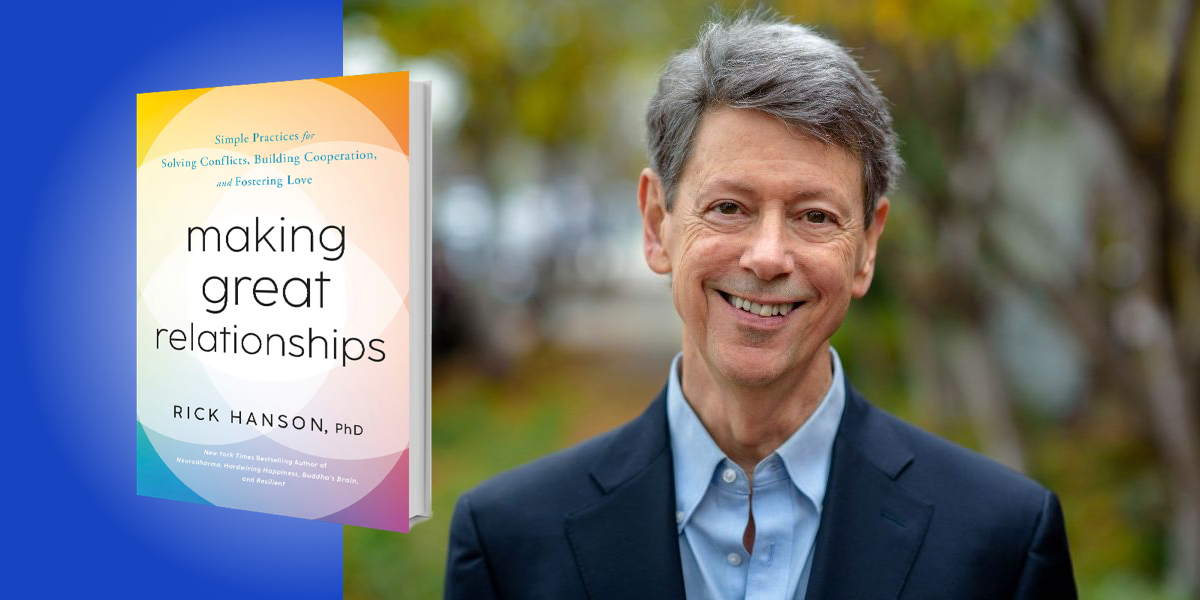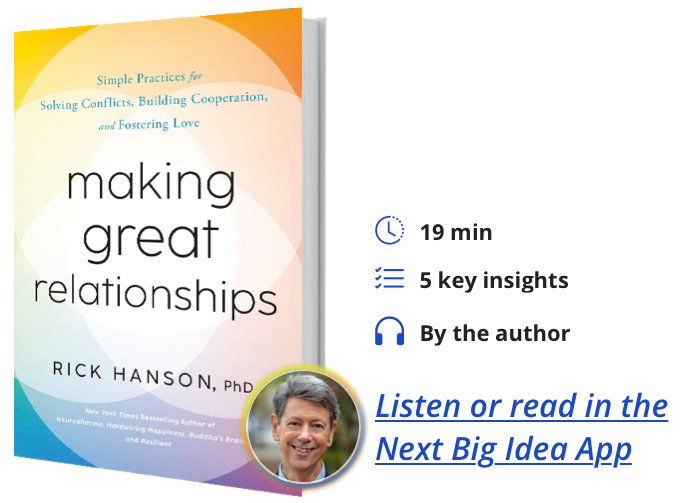Below, Rick shares 5 key insights from his new book, Making Great Relationships: Simple Practices for Solving Conflicts, Building Connection, and Fostering Love. Listen to the audio version—read by Rick himself—in the Next Big Idea App.
1. Be loyal to you.
One of the central experiences of my life happened when I was six years old. I was standing outside my home around dusk, watching the yellow light coming out of its windows, and I realized that I needed to get on my own side to find my way to happiness and to having a good life in the years to come.
There have been many ups and downs since, but this central experience and stance have remained. As a long time therapist, I’ve found that this basic attitude of being loyal to yourself is missing or undeveloped for many people.
But treating yourself like you matter is the foundation of everything good in relationships and life. If you are not for yourself, it will be hard to bounce back from losses, keep going in the face of challenges, or keep learning from your experiences and developing yourself in positive ways.
So know what it feels like to be a friend to someone, to be on their side, then apply this to yourself—be strong on your own behalf, as kind to yourself as you would be for a friend. Know what it feels like to bring encouragement, guidance, compassion, and respect to yourself. And imagine what this would be like—and the benefits to you and others—in the days to come.
2. Forgive yourself.
Forgiveness—whether of others or yourself—can include a recognition of mistakes, even moral faults. You are not waiving your rights or denying or downplaying whatever happened. But you are letting go of resentments, of driving for punishment, of carrying around your grievances like a hot stone. You’re laying down that burden.
For self-forgiveness to have traction, to be a full release, it helps to take full responsibility for whatever was your own part in the matter. This full responsibility has the wonderful effect of enabling you to see and separate from what was not your responsibility in whatever happened. How do you do this?
- Allow feelings of regret, guilt, and remorse to flow through awareness as they come and go, without following after them, fueling them, or getting caught up in them.
- Know what you are doing or going to do to repair what you can, to make amends, to apologize for if that’s appropriate.
- Know what you intend to do going forward. Feel your determination to walk a higher road next time.
- Know that you have done these things—taken responsibility, opened to feeling whatever is appropriate, and cleaned up the mess as best you can—and then actively and deliberately forgive yourself.
- You could also imagine others—friends, wise beings, perhaps something spiritual—forgiving you, even by name.
- Lastly, you can tell yourself you forgive yourself, perhaps in your mind using your own name to say something like, “Maria, I forgive you . . . . Maria, you’ve taken responsibility and done what you could, I forgive you . . . You are forgiven . . . Please know that you are truly, truly forgiven . . . “
Let this sink in. Then take a breath, and walk that higher road.
3. Take it less personally.
Two and a half thousand years ago, the Buddha pointed out that life contains some inevitable discomfort, both physically and emotionally, ranging from subtle to horrible. He referred to these as the “first darts” of life.
Then we add our reactions to these first darts, such as obsessing about what happened, holding on to resentments and grievances, or beating ourselves up with harsh self-criticism. These are the “second darts” we throw ourselves.
“Most of these upstream factors shaping whatever is happening now are impersonal, out of your hands, and not about you.”
When I step back and look at my life, it is the second darts that I’ve thrown that have been the greatest source of my own suffering, and frankly the suffering and harm I’ve thrown onto others. This might be true for you as well.
A central factor in most of our second darts is taking things personally. Sure, we need to be real about the fact—if it’s true—that someone is actually out to get us. But most of the time we are bit players in other people’s dramas, and whatever has happened is the result of hundreds, even thousands, of causes upstream: their personal history, their parents and grandparents, the economy, the culture, events a hundred years ago, etc.
Most of these upstream factors shaping whatever is happening now are impersonal, out of your hands, and not about you. Sure, we need to take care of ourselves as persons. But it brings a ton of peace to realize that so much of what happens, for better or worse, is not because reality has targeted you individually.
Besides the power of this general perspective, it’s helpful to be mindful of the intentions that we attribute to others. Watch out for assumptions such as: “they don’t like me . . . they don’t care about me . . . they’re trying to put me down . . . they’re deliberately trying to hurt me . . . ” Notice how good it feels to get some breathing room around these assumptions.
And move forward in life with strength and support for yourself, while not taking things so personally.
4. Stay right when you’re wronged.
I used to think that the best way to stand up for myself was more or less to play tit-for-tat. If someone was going to be a jerk, well I was going to be an even bigger jerk right back. I’ll show them!
But after a while I started to notice that while this might have felt good in the moment—a blast of anger releases dopamine and norepinephrine, two neurochemicals associated with a sense of reward and energy—after the dust settled, others could be reeling, or looking at me in new and skeptical ways, or criticizing how I said something as a way to avoid dealing with what I was trying to say. I also felt bad inside after the storm passed.
As a result, I started to focus more on my own side of the street, and taking a higher road when others didn’t. When you do this, you can still say what you see and what you want. But you don’t get so caught up in reacting to others, or trying to make something happen in the black box of their mind.
I call it the 80-20 rule: Put 80 percent of your attention and effort on where you have most of your actual power and influence—yourself—and only 20 percent of your attention and effort on how others could do better.
“Third parties on the sidelines see you acting with dignity and class, and they respect you for it.”
This feels good from the start since you’re focused on where you actually make things happen: your own thoughts, words, and deeds. It pulls you out of dead-end quarrels, especially with people who are just trying to get a reaction out of you. It clears the decks for others to have to focus on the substance of what you’re talking about. It removes any legitimate causes for complaint about you from another person. Third parties on the sidelines see you acting with dignity and class, and they respect you for it. And over time, this approach—staying right when you’re wronged—puts you on the moral high ground, and in a much stronger position to get what you want and need from other people.
It’s not easy to do this at first! But with practice it will become a habit. Here are some keys:
- Slow it down. Pause, take a breath, buy yourself some time. Give that smart but slow prefrontal cortex behind your forehead time to catch up to that quick but rigid amygdala that’s trying to hijack you.
- Widen your view. Be aware of your body as a whole, the room as a whole. This activates circuits in your brain that pull you out of emotional reactivity and give you a bigger perspective.
- Get centered. Take a breath and let it out slowly, engaging the calm-and-strong parasympathetic branch of your nervous system. Feel your feet on the ground.
- Keep your eyes on the prize. Know what your priorities are in this situation, in this relationship, with others who could be watching, or hearing about it later. Know what’s important to you, short-term and long-term.
- Speak your truth appropriately—including sometimes saying nothing at all. Be clear, be direct, speak from your heart as appropriate. Be careful about your tone. Let go of trying to prove yourself, impress others, or drive your point home.
- Don’t feel the need to resist what others are saying. Let it pass through you like a stormy wind through the strong branches of a deeply rooted tree.
- When it’s time to disengage, really let yourself feel good about taking that higher road, no matter what others do.
5. Resize the relationship.
Sometimes you’ve done all you can to improve a relationship at home or at work. You’ve gotten on your own side, forgiven yourself, taken things less personally, taken care of your own side of the street, and other skillful things.
And still the other person keeps letting you down, being disrespectful, giving endless unwanted advice, not keeping their agreements, or simply being a general pain in the neck. What can you do?
You can resize the relationship. Relationships need to be as big as their foundations, including in trust and safety. If a relationship is bigger than its actual foundations, that’s a risk to you and maybe others.
“Relationships need to be as big as their foundations, including in trust and safety.”
Resizing can look lots of different ways. Depending on the details, you might say to yourself something like:
Hmm, our politics are at opposite ends of the spectrum, easier not to talk about it.
After that first date, I’m not interested in romance here.
After that last project at work, I’m going to avoid being on a team with them in the future.
They get weird after a couple drinks, not going to any more bars with them.
They were a good friend in college, but at this point having lunch once or twice a year is plenty.
Not much emotional support from that person when I really needed it, not going to ask for it again.
I love my dad and am going to take care of him, but he just can’t live with us.
Ultimately, if shrinking the scope of the relationship is not enough, you may have to disengage entirely.
In some situations, the options for resizing are limited, such as a boss you are stuck with at work, or an ex that you are raising children with. But even if you can’t resize things out in the world, you can take a big step back inside your own mind.
You have the right to resize your relationships as you judge best, according to what you see and what you care about. Others may not like it, and that’s their right— just as it is your right to do what you think best.
Paradoxically, knowing that you can resize a relationship enables you to be open to others, knowing that you can change things if you need to over time. You can stay in a relationship rather than cutting someone off entirely—it’s just that now the relationship is more contained. Your boundaries are clearer, which is good for you, and usually for others, too.
To listen to the audio version read by author Rick Hanson, download the Next Big Idea App today:
































